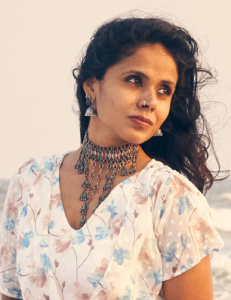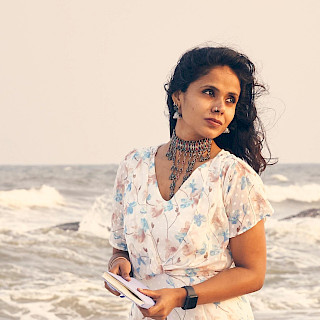Placing Poetry at the Centre by Meena Kandasamy
In this rallying piece Meena Kandasamy – Poetry judge for the 2024 Queen Mary Wasafiri New Writing Prize – traces her own journey as a writer, and sheds light on the importance of authenticity in poetry. She also talks about the types of poems that inspire her and what she is looking for in this year’s submissions.
The 2024 Queen Mary Wasafiri New Writing Prize is open until 1 July 2024. Read the full guidelines and submit your work here.
I find poetry prizes fascinating and an enriching experience. I myself refrain from making submissions because the process is always complicated by other formalities: sometimes they require you to pay a reading fee online; sometimes you need to work on an interface which was designed around the period of AltaVista; sometimes because you read about the judges and realise that they will never understand your work. The deadlines for entries sneak up on you just as you have a few hours left, and you are travelling, and your phone does not connect to the Cloud, and the internet is sketchy as hell. So, you go about life, your poetry stored in a random folder on your desktop named ‘Poetry’. Submitting is not for the faint-hearted, not for those who do not take themselves seriously. That is why I implore you to place poetry at the centre of your writing life, to try and share your work in as many venues as possible. Most people give advice from the vantage point of being good at something, my advice comes from my own lack of ability to devote more sustained attention to my poetry.
Twenty years ago, I did not have this anti-hustle attitude. Nor did I have such pessimism. When I was around eighteen, I entered a poetry contest run by the Indian Council for Cultural Relations for their magazine, Indian Horizons. I wrote poetry in secret at that point, like every other teenager. Typical for that age, I also used to have heart-to-heart conversations with myself, and one of my abiding fears was, Am I trying to fool myself that I was a writer? It is a precarious age, when one is riddled with anxieties, a time in life when we carry enough proverbial chips on our shoulder that prevent us from even standing up. I took upon myself a silly challenge — if I do not make it to the longlist (in those days they were called consolation prizes), I will stop deluding myself with these writerly pretences. My entry won the first prize, and I was over the moon. I had looked only for the slightest validation; I had received unexpected encouragement.
Whenever I am asked to judge poetry contests, I’m always reminded of my own backstory. I find it a beautiful and emotional experience because I know that at the other end, in another corner of the world (or even in my hometown) there is a first-time writer having these conversations full of self-doubt with themselves, and that as someone on the jury, we can give an aspiring writer that seal of approval, that encouragement to go ahead.
When Wasafiri’s Editor and Publishing Director, Dr Sana Goyal, asked me to be on the jury for the 2024 Queen Mary Wasafiri New Writing Prize, I was honoured. Serving on prize juries is one way of giving back to the writing community, a small way of making a difference. I am eager to read the wide variety of poems that come in, from voices that we may not have heard from before. I am looking for something that stills my blood, something that makes me say a prayer, something that induces a tear, something that makes me raise my fist in a march.
Poetry, in the aftermath of the genocide that is unfolding in Palestine, has become an urgency. Refaat Alareer’s poem ‘If I Must Die’ (translated by Sinan Antoon) spoke to us of the burden of living under occupation, and imagining how one’s death too shall preserve memory, and fuel the quest for a people’s liberation. In these times, poetry becomes a political task. In lands where poetry has been explicitly political, we have seen how the role of a poet is quickly indistinguishable from their role as a dissenter. During the protests against the Citizenship Amendment Act in India, Amir Aziz’s poem, ‘Sab Kuch Yaad Rakha Jayega’ (‘Everything Will be Remembered’) spoke for an entire generation and came to embody defiance.
There is another kind of poetry that turns me inside out, makes me collapse into tears, such as Kamala Das’ ‘The Looking Glass’ , which starts with a woman trading her feminine charms in exchange for love. Midway, the scene and mood shifts, and descends into the hellfire reserved for the anticipation of grief; a life that has to be lived without the lover’s presence. Such a poem leaves me devastated as it captures how the power of love exercised by the woman crumbles in the face of her imagined loneliness at a future point.
I love the poems of Gwendolyn Brooks and Anne Sexton and Sylvia Plath. I love the intellectualism that surrounds Claudia Rankine when she begins to dissect social attitudes. I love Lemn Sissay, Malika Booker, Daljit Nagra, Salena Godden, Mary Jean Chan, Rachel Long, and Sophie Collins, among a host of others. I love the special magic that happens when my favourite poets Bhanu Kapil and Sandeep Parmar and Nisha Ramayya sit together for a chat. I love Jericho Brown. I love Yrsa-Daley Ward. Most of my favourite poets are those I consider my friends and community — Tishani Doshi, Ranjit Hoskote, Sukrita Paul Kumar, Jeet Thayil, Jerry Pinto, and Anjum Hasan. When I look at the work of the poets who inhabit the same space-time as me and realise how all of our work is so unique and so different, I know that it is an important thing to bear in mind. That every poet is an individual, that voice matters so much, that this is not the life of mimicry. I look forward to reading your poems where you are your most vulnerable self. I want to read your poems where you are plotting an escape from your anxieties and dramas. I want to read a poem where you show me what it means to carry a broken heart, and a blazing dream.

Meena Kandasamy has been described by the Independent as a ‘one-woman, agit-prop literary-political movement’. Meena Kandasamy is a poet, writer, translator, anti-caste activist and academic based in India. Her extensive corpus includes two poetry collections, Touch (2006) and Ms Militancy (2010), as well as three novels, The Gypsy Goddess (2014), When I Hit You (2017) and Exquisite Cadavers (2019). In 2022, she was elected as a Fellow of the Royal Society of Literature (FRSL) and was also awarded the PEN Hermann Kesten Prize for her writing and work as a ‘fearless fighter for democracy, human rights and the free word.’ Her latest published work is Tomorrow Someone Will Arrest You, a collection of political poetry written over the last decade.
The 2024 Queen Mary Wasafiri New Writing Prize is open until 1 July 2024. Read the full guidelines and submit your work here.

